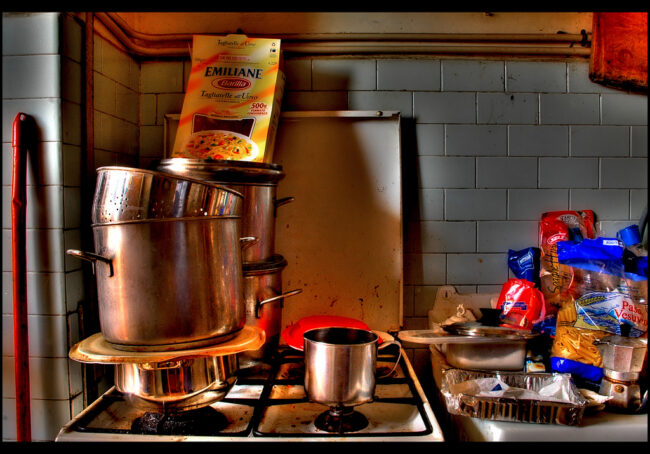Every year, the top two New Year’s resolutions made are: 1) to get fit, and 2) to lose weight. If either of those is on your to-do list, there might be a way to make it easier. This year, other than joining the gym and making green smoothies, you might want to consider cleaning your kitchen! According to a recent study conducted at Cornell Food and Brand Lab and published in the journal Environment and Behaviour, we stress-eat (cookies in particular) when we are surrounded by clutter1.
In their study, researchers asked 98 female students to taste and rate cookies, crackers and carrots, which is what participants thought the real experiment was about: taste ratings. The real thing, however, started when they were then encouraged to help themselves to leftovers. The events leading up to this snack session varied widely. Half of the participants were exposed to a chaotic kitchen filled with newspapers, pots and pans, dishes in the sink, along with noisy disruptions such as phone ringing, and even an intrusive professor. The others were in a clean, calm and orderly kitchen. In these varied kitchen environments, participants were also primed to have one of the two mindsets. They were either asked to write about a time when they felt their life was completely out of control, or an instance when they felt completely in control of their life.
So, who ate the most?
Women who were in the chaotic kitchen and wrote about being out of control ate almost twice as many cookies (53 calories more in ten minutes) as women who also wrote about being out of control but were in the clean kitchen. In the chaotic kitchen condition, women primed to feel in control of their life consumed 100 fewer total calories in cookies than those primed with a “out-of-control” mindset. Interestingly, kitchen cleanliness and mind-set didn’t really affect the quantity of carrots and crackers consumed.
Therefore, it seems like our mindset can moderate the impact of a chaotic environment on our food intake, especially for sweet munchies. Yes, chaotic environments seem to be a big risk factor for making unhealthy choices. However, our mindset in such environments can either trigger or buffer against that risk factor. Specifically, when in a chaotic kitchen, focusing our mindset on times of personal control may decrease our intake of cookies, whereas focusing on loss of control and a more stressed mindset can quickly prompt us to overeat indulgent snacks.
Lenny Vartanian, the study’s lead author says: “Being in a chaotic environment and feeling out of control is bad for diets. It seems to lead people to think, ‘Everything else is out of control, so why shouldn’t I be?’ I suspect the same would happen with men”.
Bottom line? As Brian Wansink, director of the Cornell Food and Brand Lab, suggests “It’s better to be slim by design than by willpower”. So, what about changing your new year’s resolution to keeping a spotless kitchen? If you really must be in a chaotic environment (hello messy flatmates!), then taking time to recall a more controlled time in your life should really help you resist that extra cookie!
Edited by Sarah Spence

